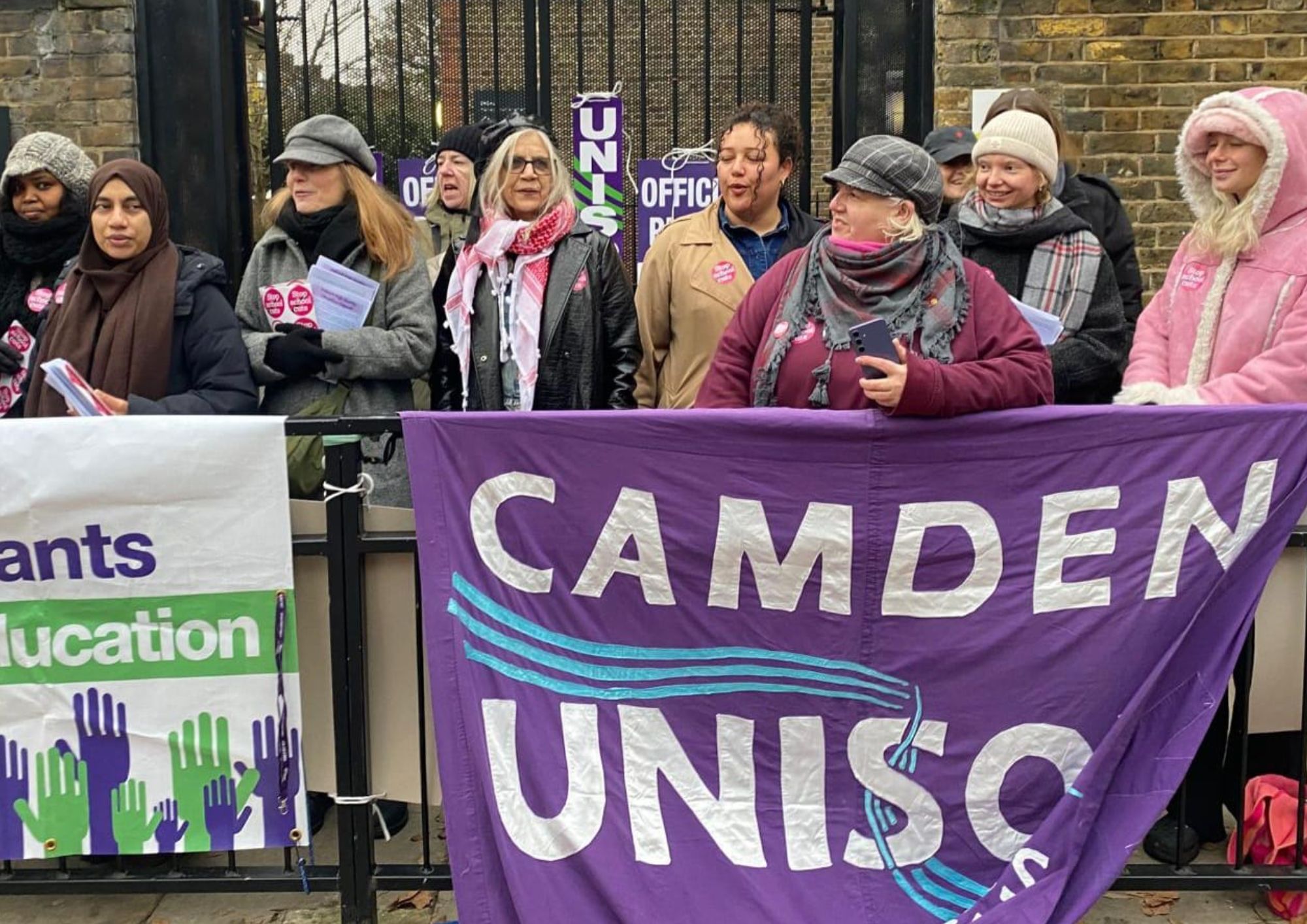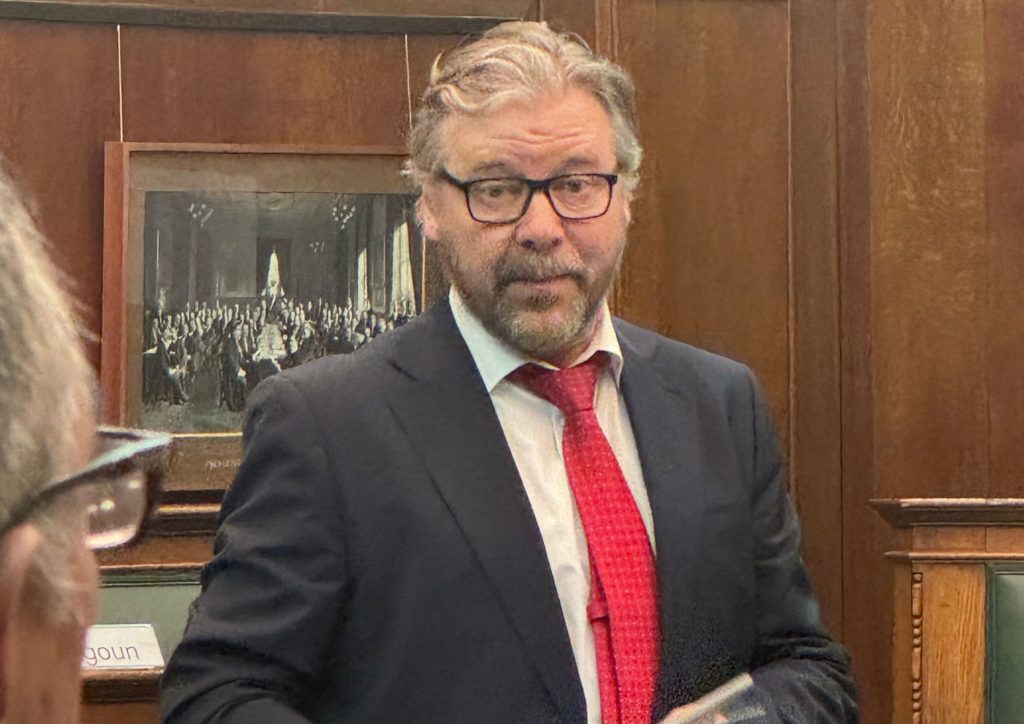Education chief is urged to help solve pay gap for ‘invisible school workers’
Marcus Boyland says he will not get involved in budgets at individual schools
Friday, 21st November 2025 — By Tom Foot and Richard Osley

Strike action at Richard Cobden Primary School this week
VITAL school staff say they are feeling “invisible” as they urged council chiefs to step in to make sure they are paid fairly.
Labour education supremo Councillor Marcus Boyland was put on the spot by striking support staff at a full council meeting on Monday night – but said he would not intervene.
The workers at Richard Cobden Primary School are in the middle of a three-day walkout and some say they have been stuck on the same wage for 15 years, even though staff at other Camden primaries get paid more for doing the same job. It is the second strike this term and it was suggested this week that industrial action is being considered by teaching assistants on lower wages at other Camden primaries.
Zoe Franklin Jones, a support worker at the school and Unison steward, said: “We know we are invisible workers and as well as being unseen, we are also underpaid.”
Councillors had child poverty and employment rights on their agenda at this week’s meeting – and campaigners were drawing a clear link to the unresolved dispute at the school in Camden Town.
Labour councillors were quick to stand up to make speeches praising the government’s employment rights bill and the importance of trade unions, but not a single one of them had any questions for the deputation in front of them from the teaching assistants.
A debate on how to meet the ongoing cost-of-living crisis, which is leaving two-fifths of children in Camden to grow up in poverty, regularly touched on the roles schools can play supporting families.
“So many of the actions are carried out by our members here – the support staff in schools, from breakfast clubs, school trips, supporting children with additional needs,” said Ms Franklin Jones.
“If the council wants to make positive changes for pupils, you also need to make changes to how workers involved are treated and paid.
“Teaching assistants are predominantly women and we’re often single parents and therefore how we’re paid affects our children too.
“In the schools, teaching assistants are the workers who make sure your children are safe, so that they feel secure and they’re helped with their education. We support the children with special educational needs so they can learn, and by doing that we also facilitate the education for the rest of the class.
“The children view us as teachers, but we are paid much, much less. Without us, a school cannot function safely and the children cannot fulfil their potential. All that we are asking is to have the same pay and the same respect that goes with that – as our colleagues in other schools have.”
Councillor Boyland said he would not get involved in the budgets of individual schools.
He said the problem was central government’s funding formula linked to pupil numbers – the decline of which has been well-documented over the past five years and at the root of three primary school closures.
The cost of impossible rent and steady gentrification of north London has been blamed for the changing nature of the borough.

Richard Cobden Primary School has seen industrial action for the second time this term
But as Labour are now in power at Westminster and choose how schools are funded, the campaigners say councillors should be more active in using their “unique” link to the prime minister – the area’s MP, Sir Keir Starmer.
“We are not bankrupting the school – that’s being done by the politicians,” Ms Franklin Jones said.
The teaching assistants are asking for a pay rise which would mean about £30 extra a week to their wage. Campaigners say that while schools have control of their budgets, the Labour-run council could intervene. Parents have signed letters supporting the workers.
The campaign bears similarities to the fight in the 2010s for catering staff at schools to be paid a London Living Wage – which Camden was not enforcing on its contractors for many years despite flying a flag above the Town Hall to show off its commitment to fair pay.
Back then dinner workers were serving food to the borough’s school pupils by day – but unable to feed their own children at home adequately at tea time.
Campaigns by Unison and the New Journal – the newspaper door-stepped the company’s chief executive – eventually saw the council drive through a pay lift which it had previously said couldn’t be done.

Councillor Marcus Boyland
In relation to the current dispute, Cllr Boyland told Ms Franklin Jones and deputation that had come to Monday’s meeting: “I’m very willing to facilitate any future meetings if it’s needed, although I don’t think the schools need me to get involved in the nitty-gritty of running their places.”
He said: “The issues you raise, I think, go right to the heart of the problem that all of us in schools are wrestling with at the moment. How do we meet the challenge of falling rolls – which means falling budgets – while maintaining the excellent and extensive school provision that we have in Camden and protect the schools that we have in Camden?”
He added: “Falling rolls and budgets is the wicked problem we are dealing with and school leaders are having to take extremely tough decisions right now.
“I know that myself and they’re making those decisions to help keep their schools afloat – and the council is working in partnership with them to provide all the help and the support it can. Of course we take this incredibly seriously and we are doing loads of work on it.”
He added: “Camden is a borough that has long fought for fair pay equality and it’s absolutely fair what you say that women are more represented in lower-paid roles due to the so-called ‘flexibility’ of these roles. I totally get that.
“We absolutely recognise it and that’s why Camden as a borough is modelling flexible working with fair rates of pay and encouraging others to do so.”